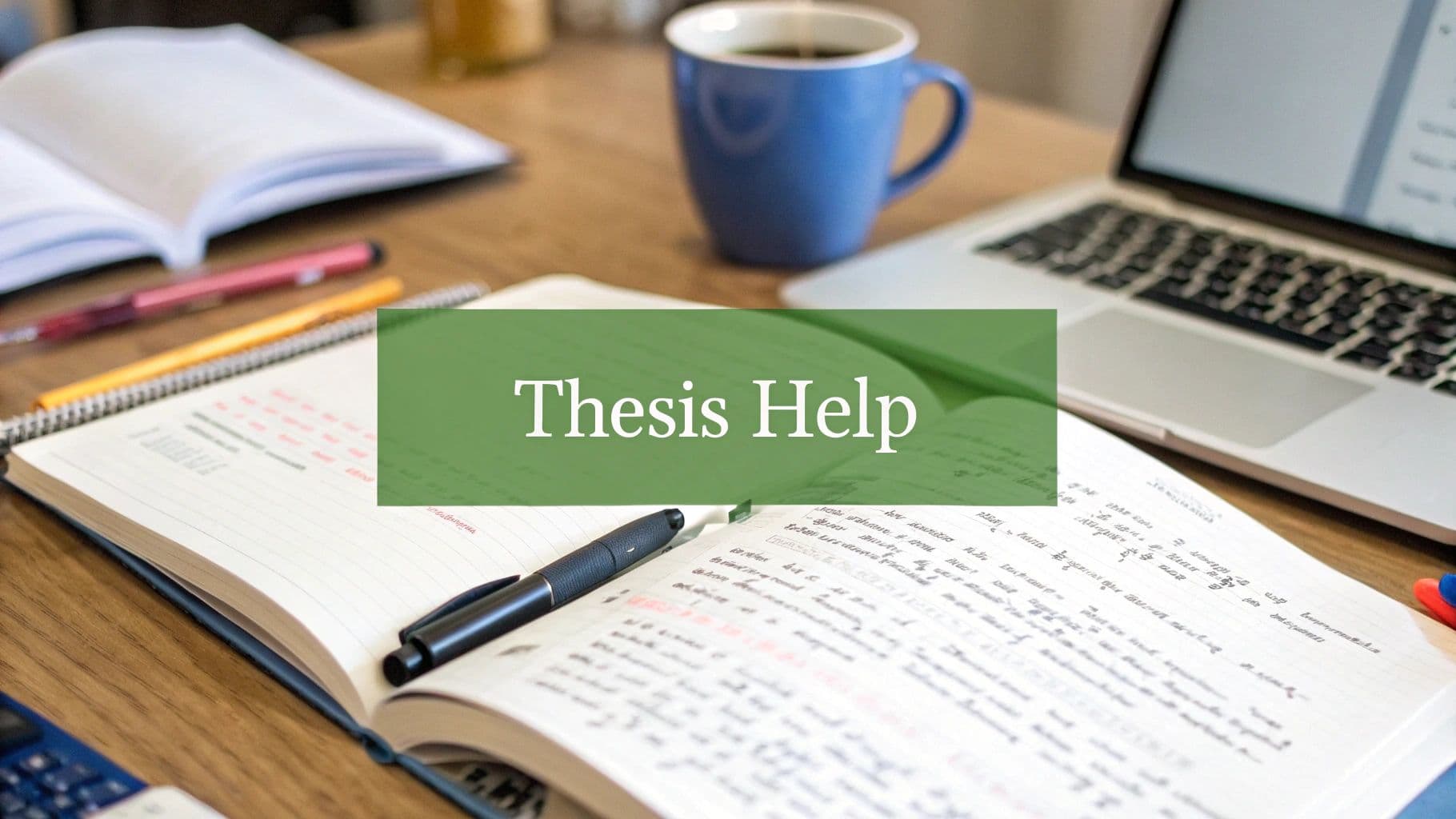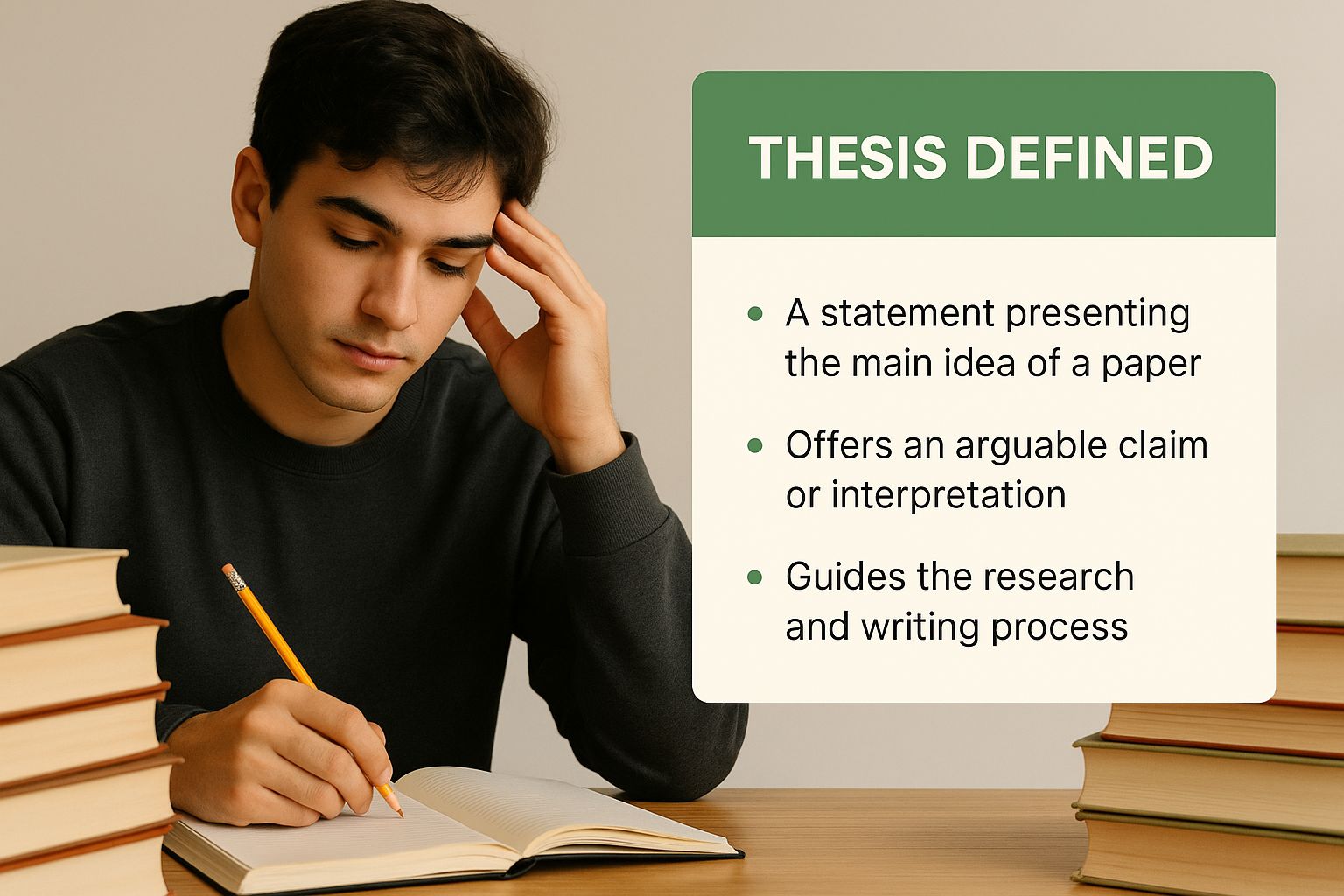
Get Expert Thesis Statement Help Today
July 20, 2025
A strong thesis isn't just a statement of fact or a topic. It's the specific, arguable claim that becomes the backbone of your entire paper. Honestly, getting this core argument right is the most important—and often the trickiest—part of academic writing. It sets the direction and gives your work a clear purpose right from the start.
So, What Does a Strong Thesis Actually Look Like?
Let's clear up a common point of confusion. So many students hand in a topic, thinking it’s a thesis. For example, "The effects of social media" is a great starting point, but it's just a topic. It doesn't argue anything.
A strong thesis takes a stand on that topic. It has to be something a reasonable person could disagree with. It also needs to be specific enough that you can actually prove it within the page count you've been given.
Think of it as the promise you make to your reader. This promise tells them exactly what you're going to argue and how you're going to prove it. Without that clarity, a paper just wanders around, presenting facts without a point. This is why getting help with a thesis is so common—the demand for thesis writing services was valued at a staggering $209 million in 2024, with that number expected to keep climbing. If you're curious about the data, you can check out this in-depth market analysis.
This image does a good job of breaking down the core idea, which can feel a bit abstract at first.

As the graphic shows, a thesis isn't just a topic—it's an assertion that you have to back up with evidence.
The Three Must-Have Qualities
From my experience, every powerful thesis statement shares three non-negotiable qualities. If your statement is missing even one of these, it's a red flag that you need to go back and revise.
A great thesis is always:
- Arguable: It can't be a simple fact or an observation everyone agrees on. There has to be room for a counter-argument.
- Specific: You need to get out of the weeds of vague language. Pinpoint exactly what you intend to prove.
- Focused: The claim has to be narrow enough to be explored thoroughly in your paper. Don't try to boil the ocean.
A great thesis acts as a roadmap for both you and your reader. It's the central pillar that holds your entire argument together, ensuring every paragraph serves a purpose in supporting your main claim.
I've seen countless students transform their papers just by sharpening their thesis. A weak statement leads to a rambling, descriptive paper, while a strong one produces a focused, persuasive argument.
It all comes down to moving from a general subject to a specific, debatable point. This table shows what that transformation looks like in practice.
From Weak Topic to Strong Thesis
| Subject | Weak Statement (The 'What') | Strong Statement (The 'Why' & 'How') |
|---|---|---|
| Working from Home | Working from home has become more common. | The widespread shift to remote work has improved employee well-being by offering greater autonomy and reducing commute-related stress, ultimately leading to higher job satisfaction. |
| Social Media | This paper will discuss the effects of social media on teenagers. | While social media offers connection, its algorithm-driven platforms negatively impact teenage mental health by creating unrealistic social comparison and disrupting sleep patterns. |
| Climate Change | Climate change is a global problem. | To effectively combat climate change, developed nations must invest in carbon capture technologies rather than relying solely on renewable energy sources, which are insufficient to meet current demands. |
See the difference? The weak statements are just observations. They state a fact or an intent to discuss something. The strong statements, on the other hand, make a clear, debatable claim. They answer the "why" and "how," giving the writer a clear path forward and the reader a reason to keep reading.
Finding Your Argument Before You Write a Word

Let's be honest: the blank page is terrifying. Most students I've worked with get stuck right here—not in the middle of writing, but in that deafening silence before a single word hits the document. The key isn't to just stare at your pile of research, hoping for inspiration. You have to actively hunt for your argument.
This is where a technique like targeted freewriting can be a lifesaver. Seriously, set a timer for ten minutes. Write nonstop about your topic, but give yourself a mission: find connections, spot contradictions, or just ask dumb questions. Don't censor yourself or worry about grammar. Just get the chaos out of your head and onto the page. You’d be amazed at what shakes loose when you stop trying to be perfect.
This pre-writing struggle is so common that it has built a massive industry around it. The global academic writing services market—which absolutely includes thesis help—was valued at a staggering $1.5 billion in 2025 and is on track to blow past $5 billion by 2033. You can dig into the data on this incredible growth yourself and see just how many people seek out this kind of support. If you're curious, you can find more insights about the academic writing market on archivemarketresearch.com.
Asking the Right Questions
Another trick I swear by is to interrogate your sources. Don't just read them and nod along. You have to poke and prod at the material until it reveals its weaknesses. That’s where your unique perspective will come from.
Here are a few questions I always use to rough up my source material and find an argument:
- What’s the big, unstated assumption this author is making?
- What does all this evidence fail to explain?
- Where does this source completely contradict that other one I just read?
- What would happen if I took this argument and applied it to a totally different situation?
A great thesis is born from tension. It lives in the gap between what your sources say and what they leave unsaid. Your job is to find that gap and build your argument right there.
From Broad Topic to Sharp Thesis
Let's walk through a real-world example. A student starts with a topic so huge it’s almost meaningless: "climate change." It's a classic trap.
But by asking critical questions, they start to notice a pattern: almost all their sources are talking about national or global solutions. This observation sparks a much better question: "What are the local economic impacts of renewable energy policies in my specific region?"
All of a sudden, they have an angle. From there, they can build a sharp, debatable thesis. Something like: "While national climate policies focus on broad emission cuts, the rollout of local wind farm subsidies in rural counties has inadvertently hurt small business growth by driving up competition for land."
See the difference? That’s how you get from a generic topic to a thesis that has teeth.
The Anatomy of an Effective Thesis Statement

Let's pull back the curtain on what makes a thesis statement work. It might feel like you're trying to nail down a complex, mysterious idea, but the most powerful thesis statements actually share a pretty simple DNA.
I've found it helpful to think of it like a flexible formula: Topic + Position + Rationale.
This isn't some rigid rule you have to follow to the letter. Think of it more as a mental checklist to make sure your statement is clear, arguable, and gives the reader a roadmap. It ensures you’ve covered all your bases: what the paper is about, your specific argument, and a preview of why you believe it.
Breaking Down the Formula
This structure is more than just a sentence—it's the blueprint for your entire essay. Each piece of the formula maps directly to a part of your paper, which makes outlining a whole lot easier.
- Topic: This is your paper's general subject. It’s the anchor. (e.g., remote work).
- Position: This is your specific, debatable claim about that topic. This is the heart of your argument. (e.g., remote work boosts employee well-being).
- Rationale: These are the core reasons you’re using to back up your position. These become the topic sentences for your body paragraphs. (e.g., by giving them more autonomy and cutting down on commute-related stress).
Using this framework helps you evolve from a foggy idea into a sharp, defensible argument. A strong thesis doesn't just guide your reader; it’s a compass that keeps your own writing focused and on track.
"While state-funded arts programs are often seen as a luxury, they are a critical economic driver for urban revitalization, creating jobs, attracting tourism, and increasing property values in surrounding neighborhoods."
Let’s break that one down. The topic is clear: state-funded arts programs. The position is that they're a "critical economic driver." And the rationale—the why—is right there: they create jobs, bring in tourists, and boost property values. In one sentence, you know exactly what that paper will argue and how it will prove its point.
Just remember, your first attempt at a thesis statement is almost never your last. The real magic happens in the revision process. For a deeper look at that, our guide on how to edit a paper has some great techniques for sharpening your arguments. Honing that core sentence is often what separates a good paper from a great one.
How to Refine and Polish Your Draft Thesis
Your first shot at a thesis statement is almost never your best one. Think of it as a rough sketch—the potential is there, but the sharp, compelling details are missing.
The real magic happens in revision. This is where you transform a clunky idea into a polished argument that can actually carry an entire paper. It’s about more than just fixing typos; it’s a strategic process.
The best writers I know are their own toughest critics. They’ve learned how to step back and honestly assess their own work. It’s a skill, and like any skill, it takes practice. The key is asking the right questions to turn a decent thesis into a great one.
Asking the Hard Questions
To get started, you need to put your thesis on trial. Don’t be afraid to be a little harsh. Exposing the weaknesses now is far better than having your professor point them out later.
Every time I work on a thesis, I run it through this personal gauntlet:
- Is it specific enough? A vague thesis is a weak thesis. Does it point to particular causes, effects, or factors? If you see phrases like "is important," that’s a huge red flag.
- Does it pass the "So What?" test? Imagine someone reading your thesis and shrugging. If their first reaction is, "so what?" then your argument doesn't have enough at stake. It needs to matter.
- Can I say this more directly? Cut every single word that isn't doing real work. Powerful arguments are almost always delivered in lean, punchy language.
This whole process is fluid. As your research deepens, your thesis should change. It’s not a failure when new evidence forces you to adjust your claim—it’s the sign of a smart, engaged writer. For more on this, our writing revision checklist can walk you through the iterative steps.
Remember, a thesis isn't set in stone. It’s a working hypothesis that gets stronger and clearer with each round of revision and every new piece of evidence you find.
A Before-and-After Example
Let's look at how this plays out in the real world. A student might start with something that’s on the right track but just isn't there yet.
Before Revision: "This paper will argue that social media platforms are bad for society because they cause mental health issues in teens."
It’s a good starting point, but it's too broad. It "announces" what the paper will do instead of making a direct, powerful claim. The word "bad" is generic and doesn't offer any real analytical direction.
Now, let's sharpen it by asking our questions.
After Revision: "While offering social connection, platforms like Instagram and TikTok negatively impact teenage mental health by fostering environments of constant social comparison and disrupting crucial sleep patterns, leading to increased anxiety."
See the difference? This version is specific (it names Instagram and TikTok and the exact mechanisms), it passes the "so what?" test (the outcome is "increased anxiety"), and it’s direct. It lays out a clear, nuanced argument that gives the reader a roadmap for the entire paper.
Common Thesis Statement Mistakes to Avoid
Crafting a strong argument is tough, and it's shockingly easy to fall into a few common traps when writing a thesis. But here’s the good news: once you learn to spot these pitfalls, they become simple to fix. Getting this right is a huge part of writing a paper that actually lands.
One of the most frequent errors I see is the announcement. This is when your thesis just declares what the paper is about instead of making an actual claim. It’s a road sign, not a destination.
- The Mistake: "In this essay, I will analyze the pros and cons of year-round schooling."
- The Fix: "While year-round schooling aims to prevent learning loss, its implementation disrupts family schedules and fails to produce significant academic gains, making it an ineffective educational model."
Another classic misstep is stating a fact instead of an argument. A thesis has to be debatable. If it's something everyone already agrees with, what's the point of the paper?
- The Mistake: "Many teenagers use social media platforms."
- The Fix: "The constant curation of online personas on social media platforms directly contributes to heightened anxiety and a diminished sense of self-worth among teenagers."
A Question Is Not a Thesis
Finally, your thesis can never be a question. A good research question is the spark that gets you started, but your thesis statement has to be the answer. It’s the definitive stance you're taking.
The pressure to produce these well-structured papers is immense. In fact, the global essay writing service market was valued at $1.97 billion in 2023. You can see more data on this growing demand over at dataintelo.com.
A thesis statement is the destination, not the journey. It provides a clear, confident answer that your paper will spend its time proving. Don't leave your reader hanging with a question mark.
- The Mistake: "Should cities invest more in public transportation?"
- The Fix: "Increased municipal investment in public transportation is essential for reducing urban traffic congestion, lowering carbon emissions, and creating more equitable access to economic opportunities for all residents."
Avoiding these simple but critical mistakes will immediately elevate your writing. For more hands-on advice on sharpening your arguments, check out our guide to improve your academic writing skills. It’s packed with practical tips that make a real difference.
Quick Answers to Your Thesis Questions
Even with a solid grasp of the basics, a few specific questions always seem to surface. This is where we get into the nitty-gritty—some quick, direct answers to clear up any lingering confusion so you can get back to writing.
Let's dig into the most common questions I get from students.
Can a Thesis Be More Than One Sentence?
Yes, it can—but you need to be careful here. While most professors want a single, powerful sentence, a really complex argument might justify spilling over into two. You'll typically see this in longer research papers or dissertations where you're juggling multiple, interlocking claims.
For most undergraduate papers, though, aim for one sentence. Honestly, the exercise of boiling your entire argument down into one focused statement is a skill in itself. It forces you to be crystal clear and keeps your paper from wandering off track.
Where Does the Thesis Go?
The classic spot for a thesis statement is at the very end of your introductory paragraph. This isn't just a random rule; it’s a strategic choice. You spend the intro grabbing your reader's attention and giving them the context they need, then you hit them with the core argument they can expect you to prove.
Putting it there makes for a perfect handoff to your body paragraphs, where you’ll immediately start laying out the evidence to back up your claim.
A great thesis isn't just an argument; it's a structural anchor. Its placement at the end of the introduction signals to the reader, "Here is the central point, and everything that follows will support it."
What's the Difference Between a Thesis and a Hypothesis?
This one is crucial, especially for anyone doing work in the sciences. Think of it this way:
A hypothesis is a testable prediction. It's your educated guess that you plan to either prove or disprove through an experiment. For example: "Students who get more sleep will have higher test scores." You'd set up an experiment to test that.
A thesis statement, on the other hand, is an arguable claim you support by analyzing evidence—like texts, data, or historical documents. It’s all about interpretation and building a case, not running a scientific test.
Feeling stuck trying to perfect your argument? The right words can make all the difference. Natural Write instantly refines your AI-generated drafts into clear, human-like prose that passes AI detection with ease. Polish your thesis statement and entire paper confidently. Try it for free.


